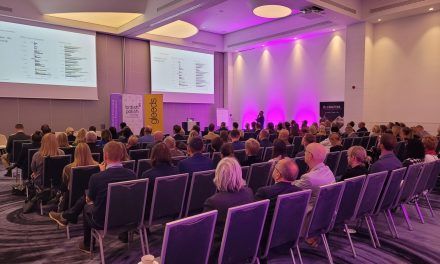

Six years ago, when I was standing in front of the building of the Polish Ministry of Digital Affairs, about to start my new job, little did I know that digitalisation would become an integral part of my professional and everyday life. From this moment on, I got to witness first-hand the speed at which digital technology was developing and how challenging it was for policy and regulation to keep up. The multitude of digital strategies and legislation at both EU and national level, we as civil servants, had to process and implement, was indeed demanding. But it is the experience and know-how that I cherish greatly and would not change, no matter what, as it allowed me to move on to the next chapter of my career – to become an advisor, consultant for clients from the private sector, someone who can help them navigate through the intricacies of digital politics and regulations – in other words, a public affairs manager at Grayling – a leading strategic communications consultancy in Poland and globally.
Europe is setting the bar high
Digitalisation has grown into a subject of its own. Even though, today the hot topic everyone is talking about is artificial intelligence, if we were to pause for a moment and look around, we would spot a digital component in almost every aspect of public, social or economic activity. We are living in a digital society and do business in a digital economy. That is a fact, which was also confirmed by the European Commission (EC) in 2022, when it unveiled Europe’s Digital Decade 2030 policy programme[1]. The project maps out EU digital ambitions in the form of concrete targets for the member states to reach in the next decade. The EC focuses on four main areas: skills, business, infrastructure and government. In numbers it looks as follows: 20 million employed IT specialists, 80% of adults can use tech for everyday tasks; 75% of companies use cloud, big data or AI, 90% of SMEs have taken up tech; high-speed mobile coverage everywhere; 20% of world’s semi-conductors produced by the EU, 10,000 cloud edge nodes, 100% of key public services are online.
These are most ambitious targets, but they have to be achieved in order for Europe to keep up with the likes of US and China – digital giants which spare no time and money to use to a maximum what digital technology has to offer.
Is Poland ready to embrace the digital revolution?
How does Poland pan out against all this? Is it on the road to becoming a fully digital state? Well, even though in the Digital Economy and Society Index (DESI)[2], out of all 27 member states, Poland is placed 24th, significant progress has been made to digitalise public administration. The mObywatel e-wallet app and the government website gov.pl have facilitated access to e-government services and made contact with public bodies more user-friendly. The same can be said about the process of opening of public data to the market, which has been going very smoothly. Many efforts have also been taken to boost digital skills of Polish citizens and to convince the best IT experts to join the public service.
Cracking the regulatory jigsaw
Behind this digital transformation is another very important layer – regulation. In recent years, the European Commission has published countless pieces of legislation to regulate different facets of digitalisation, which must next be implemented by member states into the national legal framework. Some say this proliferation of legislative acts is an additional burden imposed on the European digital market, slowing down innovation. However, there are two sides of every coin and one can argue that a technology that is impregnating all parts of society, simply cannot be left to its own devices, but needs rules and human oversight.
Let’s look at data for example. In the last years it has become a highly-valued commodity fuelling the data economy and digital technology like AI. Thanks to regulations such as the Data Governance Act or the Data Act public and business data was opened up and put to the market for re-use to serve EU society as a whole. However, data, and especially personal and sensitive data, cannot be lost in this race towards innovation and must be appropriately protected. The enactment of the General Data Protection Regulation (GDPR) established such a comprehensive framework and became a global standard, adopted by countries from all over the world. Data protection goes hand in hand with cybersecurity. More and more, Europe has been the target of malicious cyberattacks. A coordinated response of all member states is needed to ensure security of cyberspace. The Directive on measures for a high common level of cybersecurity across the EU (NIS2 Directive), the Cyber Resilience Act and the EU Cyber Solidarity Act have all been designed to achieve this goal.
For the digital revolution to be a success, it needs to be trusted. There has been so much disinformation, algorithm manipulation and interference in electoral processes that the only way for citizens to feel safe in a digital world is to have concrete regulations, which will guarantee respect of their rights. That was one of the main reasons for the adoption of the Digital Services Act (DSA). For a long time, large social networks, online marketplaces or content-sharing platforms have been operating with no supervision whatsoever, bringing a feeling of unfairness and abuse amongst users and business partners. The DSA was a milestone in establishing legal order in the provision of online services. Trust and a level-playing field are also needed in business. The Platform to Business Regulation and later on the Digital Markets Act were an attempt to restore fair competition on the EU market.
Public affairs managers to the rescue
The list of digital acts goes on and to be fair, as things stand now, almost all sectors of the economy have a digital element – transport, healthcare, finance, etc. The bottom line is that digital transformation is progressing at an extremely fast pace, with regulators bending over backwards to adapt the regulatory framework to emerging technology. It is our role as public affairs managers to constantly be on the look-out for new policies and legislation, have an understanding of how this process works and advise our clients on the best course of action for their particular business model. It is not any easy job; it requires diligence, ability and willingness to dive into different areas of the economy and of course deep understanding of public policy. I for one absolutely love it. Being a part of this experience at Grayling, together with my client, is most rewarding. It allows me to challenge myself and in some ways play a role in shaping the future, which ultimately will be digital.
[1] https://digital-strategy.ec.europa.eu/en/policies/europes-digital-decade
[2] The Digital Economy and Society Index (DESI) summarises indicators on Europe’s digital performance and tracks the progress of EU countries.
























